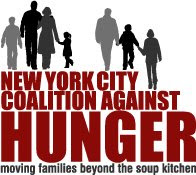In April, the Legislature and the Governor cut by 16% the Hunger Prevention and Nutrition Assistance Program (HPNAP), the main source of State funding for charitable food pantries, soup kitchens, and food banks that feed hungry New Yorkers in suburban, rural and urban communities across the state. On top of that, the State just agreed to an additional 6% cut in any HPNAP funding for this year that has not already been spent, thereby cutting another $1.2 million out of the HPNAP budget.
Governor Paterson joined the State Senate in rejecting a State Assembly plan that would have prevented funding cuts by slightly increasing the income tax rate on New Yorkers who make over $1 million a year.
“Given that Governor Paterson previously had such a progressive record in public life, it is particularly distressing that he has twice chosen to prove his supposed ‘fiscal toughness’ in his new job by balancing the budget on the back of the state’s most vulnerable residents,” said Joel Berg, executive director of the New York City Coalition Against Hunger. “Surely a much better alternative would have been restoring previous, fairer levels of taxation to the very wealthiest people who earn income in
The cuts come on the heels of a New York City Human Resources Administration (HRA) report that City-supported pantries served 1.39 million meals in March and April, 9.3% more than the same period in 2007.
For soup kitchen and food pantry customers, the cuts mean less food and more hunger. Governor Paterson has utilized the occasion of the recent budget cuts to emphasize his sensitivity to criticism from agencies affected by recent cuts, rather than acknowledging the needs of New Yorkers who have been forced to rely on these agencies. Paterson’s fits of conscience, however, have not led to increased funding for programs that stop children from going hungry. Said Natasha, a pantry customer who waited in line for two hours for a bag of packaged food, “the Governor should speak to the people who go through this.”

2 comments:
How do you make the rich pay their "fair" share when they already pay a greater percentage of their income in taxes than those in the lesser classes. This makes no sense.
Actually, wealthy Americans currently pay less of a percent of their total income in sales and income tax than any demographic in any other industrialized nation in the world, while benefiting disproportionately from wealth generated by government funding. Furthermore, as the incomes of the rich have increased exponentially over the past quarter century, the percentage of income the wealthiest Americans pay in taxes has plummeted from 60% in 1980 to 34% today. You can say many things about the current state of taxation: but that it is "fair" is not one of them.
Post a Comment